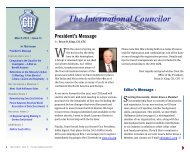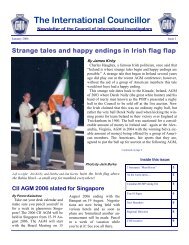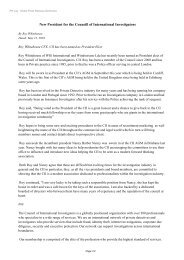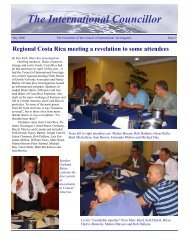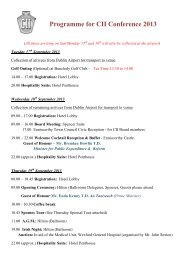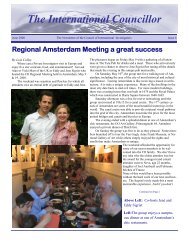Corporate investigations in Africa - Council of International ...
Corporate investigations in Africa - Council of International ...
Corporate investigations in Africa - Council of International ...
Create successful ePaper yourself
Turn your PDF publications into a flip-book with our unique Google optimized e-Paper software.
<strong>Corporate</strong><br />
<strong><strong>in</strong>vestigations</strong> <strong>in</strong> <strong>Africa</strong><br />
The country risk perspective<br />
Eunomix de-risks m<strong>in</strong><strong>in</strong>g and resource <strong>in</strong>vestments <strong>in</strong> <strong>Africa</strong><br />
www.eunomix.com
<strong>Africa</strong> ris<strong>in</strong>g<br />
Page 1<br />
► The rise <strong>of</strong> <strong>Africa</strong> is upon us! Your presence here, I hope, testifies to<br />
this<br />
► There is much talk <strong>of</strong> an <strong>Africa</strong>n Renaissance, even <strong>of</strong> an <strong>Africa</strong>n<br />
decade, with the cont<strong>in</strong>ent at long last jo<strong>in</strong><strong>in</strong>g Asia and Lat<strong>in</strong><br />
America <strong>in</strong> the club <strong>of</strong> emerg<strong>in</strong>g economies<br />
► This ‘Afroptimism’ contrasts spectacularly with the Afro-pessimism<br />
<strong>of</strong> the 1980s, 1990s and early 2000s. Only ten years ago, The<br />
Economist famously described <strong>Africa</strong> as the hopeless cont<strong>in</strong>ent. It<br />
recently expressed remorse for this mistaken call<br />
► Many facts support the new outlook<br />
<strong>Corporate</strong> <strong><strong>in</strong>vestigations</strong> <strong>in</strong> <strong>Africa</strong>: the country risk perspective
<strong>Africa</strong> ris<strong>in</strong>g<br />
Page 2<br />
► What a difference a decade make!<br />
2000 2011<br />
<strong>Corporate</strong> <strong><strong>in</strong>vestigations</strong> <strong>in</strong> <strong>Africa</strong>: the country risk perspective
<strong>Africa</strong> ris<strong>in</strong>g – the economics<br />
Page 3<br />
► Average growth was 4.6% <strong>in</strong> the 2000s, up from 1.9% <strong>in</strong> the 1980s<br />
and 2.2% <strong>in</strong> the 1990s<br />
► Today, six <strong>of</strong> the world’s fastest grow<strong>in</strong>g economies are <strong>in</strong> <strong>Africa</strong><br />
► The cont<strong>in</strong>ent’s population is 1 billion, and is set to double by 2050.<br />
Its emerg<strong>in</strong>g middle class is still comparatively small at 320 million,<br />
but grow<strong>in</strong>g rapidly<br />
► FDI <strong>in</strong>to <strong>Africa</strong> has grown spectacularly<br />
► Firms from the Old World are compet<strong>in</strong>g aga<strong>in</strong>st those <strong>of</strong> the New<br />
New World for access to markets and resources<br />
► Investment banks, private equity firms and hedge funds are<br />
flock<strong>in</strong>g <strong>in</strong>, scout<strong>in</strong>g the cont<strong>in</strong>ent for opportunities<br />
<strong>Corporate</strong> <strong><strong>in</strong>vestigations</strong> <strong>in</strong> <strong>Africa</strong>: the country risk perspective
<strong>Africa</strong> ris<strong>in</strong>g – the economics<br />
Page 4<br />
► What a difference a decade makes!<br />
Source: World Bank<br />
Source: World Bank<br />
Source: Unctad<br />
<strong>Corporate</strong> <strong><strong>in</strong>vestigations</strong> <strong>in</strong> <strong>Africa</strong>: the country risk perspective
<strong>Africa</strong> ris<strong>in</strong>g – the politics<br />
Page 5<br />
► And it is not only about economics. <strong>Africa</strong>’s stability and<br />
governance record has significantly improved<br />
► The 2000s saw a record low number <strong>of</strong> wars, civil wars and coup<br />
d'état<br />
► There are now a majority <strong>of</strong> democracies, where they were the<br />
m<strong>in</strong>ority until the late 1990s<br />
► There is greater freedom <strong>of</strong> expression, <strong>in</strong>clud<strong>in</strong>g a vibrant press,<br />
and access to cell phones. It is not an exaggeration to say that the<br />
cell phone has revolutionised <strong>Africa</strong><br />
► Human rights have significantly improved<br />
<strong>Corporate</strong> <strong><strong>in</strong>vestigations</strong> <strong>in</strong> <strong>Africa</strong>: the country risk perspective
Doubts <strong>of</strong> the <strong>Africa</strong> hand<br />
Page 6<br />
► For an “<strong>Africa</strong> hand” like me, who resisted the strong calls to “go<br />
East”, back <strong>in</strong> 2000 these are excit<strong>in</strong>g and lucrative times<br />
► But <strong>in</strong> a world <strong>of</strong> speculative bubbles, this spectacular change <strong>of</strong><br />
dest<strong>in</strong>y is rais<strong>in</strong>g some discomfort with <strong>Africa</strong> hands:<br />
► Richard Dowden, <strong>of</strong> the <strong>Africa</strong> Institute, wonders if the growth is<br />
susta<strong>in</strong>able without a larger middle class<br />
► Diane Gammes, who has just released a book called ‘Bus<strong>in</strong>ess <strong>in</strong> <strong>Africa</strong>:<br />
<strong>Corporate</strong> Insights’, questions the data beh<strong>in</strong>d the hype<br />
► As for me, while I see the sea change, from Dakar to Nairobi, I also<br />
see that the growth is shallow and the long-term conditions its<br />
susta<strong>in</strong>ability rema<strong>in</strong> largely absent<br />
<strong>Corporate</strong> <strong><strong>in</strong>vestigations</strong> <strong>in</strong> <strong>Africa</strong>: the country risk perspective
Unpack<strong>in</strong>g the story<br />
Page 7<br />
► A few facts stand-out from our own analysis:<br />
► The six <strong>Africa</strong>n star performers <strong>of</strong> 2010 had growth <strong>of</strong> between 8% and 13%,<br />
and ma<strong>in</strong>ta<strong>in</strong>ed this <strong>in</strong> 2011, but: comb<strong>in</strong>ed, these countries GDP represent less<br />
than 0.4% <strong>of</strong> the GDP <strong>of</strong> the USA, and less than 0.01% <strong>of</strong> the world’s. The global<br />
economic impact <strong>of</strong> their growth is negligible<br />
► The top ten economies only represented the equivalent <strong>of</strong> 3.6% <strong>of</strong> the USA, and<br />
less than 1 percent <strong>of</strong> the world<br />
► Sub-Saharan <strong>Africa</strong>’s total GDP was only 4.6% <strong>of</strong> the USA, and 1.3% <strong>of</strong> the world<br />
► Of the star performers only Ethiopia and Liberia are not rent economies –<br />
dependent on either oil & gas or m<strong>in</strong>erals (or both) for growth<br />
► Most <strong>of</strong> the star performers are highly dependent on the rent for their growth:<br />
60% for the Congo, 50% for Angola, 40% for Chad<br />
► The 24 resource-rich countries account for 75% <strong>of</strong> the region’s economy, FDI,<br />
and contribute to its growth <strong>in</strong> the same proportion<br />
► FDI is concentrated <strong>in</strong> resources (oil & gas and m<strong>in</strong><strong>in</strong>g) and <strong>in</strong>frastructure<br />
<strong>Corporate</strong> <strong><strong>in</strong>vestigations</strong> <strong>in</strong> <strong>Africa</strong>: the country risk perspective
Unpack<strong>in</strong>g the story<br />
Page 8<br />
► Much ado about noth<strong>in</strong>g?<br />
<strong>Corporate</strong> <strong><strong>in</strong>vestigations</strong> <strong>in</strong> <strong>Africa</strong>: the country risk perspective
Unpack<strong>in</strong>g the story<br />
Page 9<br />
► Much ado about noth<strong>in</strong>g?<br />
Source: Unctad<br />
<strong>Corporate</strong> <strong><strong>in</strong>vestigations</strong> <strong>in</strong> <strong>Africa</strong>: the country risk perspective
Unpack<strong>in</strong>g the story<br />
Page 10<br />
► Why does this matter?<br />
► Because a strong correlation between resources and growth means a<br />
great sensitivity to commodity booms and busts<br />
► Because resource economies suffer from Dutch disease, and are<br />
therefore afflicted by low levels <strong>of</strong> agricultural and <strong>in</strong>dustrial<br />
development – <strong>Africa</strong> has systematically missed <strong>in</strong>dustrialisation, and<br />
appears to be set to cont<strong>in</strong>ue to do so<br />
► Because these economies require very little <strong>in</strong>vestment <strong>in</strong> social capital,<br />
and tend to encourage rent-seek<strong>in</strong>g and predatory behaviours –<br />
economic and political – on the part <strong>of</strong> the rul<strong>in</strong>g elite<br />
<strong>Corporate</strong> <strong><strong>in</strong>vestigations</strong> <strong>in</strong> <strong>Africa</strong>: the country risk perspective
Unpack<strong>in</strong>g the story<br />
Page 11<br />
► It should therefore be no surprise that:<br />
► Dur<strong>in</strong>g the 1970s <strong>Africa</strong> grew at an average 4%; between 1970 and<br />
1974 it grew at 5.6%, and then tumbled down – this was dur<strong>in</strong>g a<br />
commodity boom, and after…<br />
► That growth collapsed <strong>in</strong> 2008-09 for most countries, particularly the<br />
resource rich ones, and recovered after the massive Ch<strong>in</strong>ese fiscal<br />
stimulus pumped USD 586 billion <strong>in</strong> the economy, and fed a commodity<br />
guzzl<strong>in</strong>g construction boom – with many bridges to nowhere<br />
► That the star performers <strong>of</strong> today and <strong>of</strong> the past few years do not have<br />
good democratic credentials and stellar human rights records<br />
► That growth rema<strong>in</strong>s very skewed toward the few, has done little to<br />
create susta<strong>in</strong>able employment for the rapidly grow<strong>in</strong>g youth, and is<br />
not lead<strong>in</strong>g to the creation <strong>of</strong> a sound economic foundation<br />
<strong>Corporate</strong> <strong><strong>in</strong>vestigations</strong> <strong>in</strong> <strong>Africa</strong>: the country risk perspective
Page 12<br />
The fundamentals <strong>of</strong> transformation are weak<br />
► <strong>Africa</strong> rema<strong>in</strong>s exposed to <strong>in</strong>stability, from the top, from the bottom<br />
and from the middle<br />
► From the top, democratisation is still partial and vulnerable to<br />
capture by the same old elite or by challengers who want power<br />
(the army capta<strong>in</strong>s who don’t know what they don’t know)<br />
► From the bottom, the masses <strong>of</strong> poor and unemployed have much to<br />
lose to economic booms and busts, and are prone to riots <strong>of</strong><br />
survivals and are easy pray to the populism <strong>of</strong> the typical <strong>Africa</strong>n<br />
strong man<br />
► The middle class is push<strong>in</strong>g for democratisation and economic<br />
reform, but it is still <strong>in</strong> m<strong>in</strong>ority and is highly dependent on the<br />
services sector, itself dependent on the resource rent. It is fragile!<br />
<strong>Corporate</strong> <strong><strong>in</strong>vestigations</strong> <strong>in</strong> <strong>Africa</strong>: the country risk perspective
Page 13<br />
The fundamentals <strong>of</strong> transformation are weak<br />
► Still on his way, or f<strong>in</strong>ally on the way out?<br />
Zimbabwe’s<br />
Mugabe<br />
I’m still stand<strong>in</strong>g!<br />
Equatorial<br />
Gu<strong>in</strong>ea’s<br />
Obiang<br />
DRC’s Kabila<br />
<strong>Corporate</strong> <strong><strong>in</strong>vestigations</strong> <strong>in</strong> <strong>Africa</strong>: the country risk perspective
Page 14<br />
The fundamentals <strong>of</strong> transformation are weak<br />
► Still on his way, or f<strong>in</strong>ally on the way out?<br />
A little help from my friends?<br />
Libya’s Gadhafi & Cote<br />
d’Ivoire’s Gbagbo<br />
Gu<strong>in</strong>ee’s<br />
Camara<br />
Senegal’s<br />
Wade<br />
<strong>Corporate</strong> <strong><strong>in</strong>vestigations</strong> <strong>in</strong> <strong>Africa</strong>: the country risk perspective
Page 15<br />
The fundamentals <strong>of</strong> transformation are weak<br />
► Unsurpris<strong>in</strong>gly, <strong>Africa</strong> still performs poorly <strong>in</strong> most key <strong>in</strong>dicators <strong>of</strong> state<br />
performance:<br />
►<br />
►<br />
It does poorly <strong>in</strong> Do<strong>in</strong>g Bus<strong>in</strong>ess, the Competitiveness Index, the different human rights<br />
<strong>in</strong>dexes, World Health <strong>in</strong>dexes.<br />
All <strong>of</strong> <strong>Africa</strong>’s states are considered weak states, many are fragile, a few are failed or<br />
collapsed:<br />
►<br />
►<br />
►<br />
Weak states are def<strong>in</strong>ed by the Brook<strong>in</strong>gs Institution “as countries lack<strong>in</strong>g the capacity and/or will to<br />
foster an environment conducive to susta<strong>in</strong>able and equitable economic growth; to establish and<br />
ma<strong>in</strong>ta<strong>in</strong> legitimate, transparent, and accountable political <strong>in</strong>stitutions; to secure their populations<br />
from violent conflict and to control their territory; and to meet the basic human needs <strong>of</strong> their<br />
population.” (Brook<strong>in</strong>gs Institution, 2008)<br />
The failed state’s degree <strong>of</strong> degradation is greater than the weak state’s: “Failure for a nation-state<br />
looms when violence cascades <strong>in</strong>to all-out <strong>in</strong>ternal war, when standards <strong>of</strong> liv<strong>in</strong>g massively deteriorate,<br />
when the <strong>in</strong>frastructure <strong>of</strong> ord<strong>in</strong>ary life decays, and when the greed <strong>of</strong> rulers overwhelms their<br />
responsibilities to better their people and their surround<strong>in</strong>gs.” (Rotberg, 2002)<br />
The collapsed state is the f<strong>in</strong>al stage <strong>of</strong> decay: “A collapsed state is a political black hole. The<br />
government, if it exists at all, provides no political goods <strong>of</strong> any k<strong>in</strong>d, and to get by there requires either<br />
expos<strong>in</strong>g oneself to all the risks <strong>of</strong> daily life or obta<strong>in</strong><strong>in</strong>g such goods privately from some nongovernmental<br />
entity such as a warlord.” (Rotberg 2003)<br />
<strong>Corporate</strong> <strong><strong>in</strong>vestigations</strong> <strong>in</strong> <strong>Africa</strong>: the country risk perspective
What does it mean for bus<strong>in</strong>ess?<br />
Page 16<br />
► Despite clear improvements, risks are ever present, aris<strong>in</strong>g from:<br />
► a higher <strong>in</strong>cidence <strong>of</strong> military conflicts and civil strife<br />
► a weaker political governance and rule <strong>of</strong> law<br />
► a fragile economic growth and poor <strong>in</strong>frastructure<br />
► and higher levels <strong>of</strong> poverty and <strong>in</strong>equality<br />
► <strong>Africa</strong>n countries are <strong>in</strong>herently more vulnerable to upheavals. This is<br />
pr<strong>in</strong>cipally because <strong>of</strong> their lower capacity to:<br />
► keep conflicts under control and resolve them before they turn violent<br />
► ensure fair and susta<strong>in</strong>able political and economic participation and<br />
outcomes<br />
► provide broadly accessible and effective public services<br />
► and ensure opportunity for the vast majority<br />
<strong>Corporate</strong> <strong><strong>in</strong>vestigations</strong> <strong>in</strong> <strong>Africa</strong>: the country risk perspective
What does it mean for bus<strong>in</strong>ess?<br />
Page 17<br />
► Upheavals occur frequently. S<strong>in</strong>ce 2000, twenty countries have<br />
experienced serious security and political crises. Some <strong>of</strong> these<br />
countries were reputed stable – like Mali. Past stability is no<br />
guaranty <strong>of</strong> future stability.<br />
► Even <strong>in</strong> stable countries conditions for <strong>in</strong>vest<strong>in</strong>g, operat<strong>in</strong>g and<br />
repatriat<strong>in</strong>g pr<strong>of</strong>its are challeng<strong>in</strong>g:<br />
► contracts and property rights are difficult to enforce<br />
► critical <strong>in</strong>puts, <strong>in</strong>clud<strong>in</strong>g skills and capital, are scarce<br />
► essential production and transport <strong>in</strong>frastructures are <strong>in</strong> short supply<br />
► adm<strong>in</strong>istrative efficiency is low, and corruption is high<br />
► policy changes occur frequently and are <strong>of</strong>ten drastic<br />
► Costs are higher. Projects require more time to develop. Assets are less<br />
productive. Economic returns face greater uncerta<strong>in</strong>ty.<br />
<strong>Corporate</strong> <strong><strong>in</strong>vestigations</strong> <strong>in</strong> <strong>Africa</strong>: the country risk perspective
And for corporate <strong><strong>in</strong>vestigations</strong>?<br />
Page 18<br />
► Conduct<strong>in</strong>g <strong><strong>in</strong>vestigations</strong> <strong>in</strong> <strong>Africa</strong> is challeng<strong>in</strong>g:<br />
► In some countries, private <strong><strong>in</strong>vestigations</strong> are illegal<br />
► Different legal systems: Common (English-based), Roman/civil<br />
(Belgian-,Dutch-, French- and Portuguese-based), bijudirical, Islamic<br />
► Industry regulation is arcane or non-exist<strong>in</strong>g – abuse and be abused<br />
► Labour laws are cumbersome and pro-labour<br />
► Crim<strong>in</strong>al and civil legal systems are under-funded, under-equipped, lack<br />
<strong>in</strong>dependence, and are <strong>of</strong>ten corrupt – police, prosecution, courts<br />
► No effective public records systems, let alone accessible ones<br />
► Privacy laws, if they exist, are not enforced, or are selectively enforced<br />
► Confidential <strong>in</strong>formation can be obta<strong>in</strong>ed through bribery and collusion<br />
► Protection aga<strong>in</strong>st <strong>in</strong>vestigation and prosecution can be bought<br />
► Good, <strong>in</strong>dependent, <strong>in</strong>vestigators are scarce<br />
<strong>Corporate</strong> <strong><strong>in</strong>vestigations</strong> <strong>in</strong> <strong>Africa</strong>: the country risk perspective
And for corporate <strong><strong>in</strong>vestigations</strong>?<br />
Page 19<br />
► Given this, <strong><strong>in</strong>vestigations</strong> need to be conducted with this <strong>in</strong> m<strong>in</strong>d:<br />
► Know the country laws – crim<strong>in</strong>al, civil, privacy, IT, etc.<br />
► Regularly consult a local competent, reputable lawyer for advice and<br />
support – do a through due diligence!<br />
► Understand the capabilities <strong>of</strong> the police and prosecution – carefully<br />
consider whether reach<strong>in</strong>g out or avoid<strong>in</strong>g<br />
► Use highly reputable local forensic firm – go for the established<br />
account<strong>in</strong>g firms (big names like KPMG, E&Y, BDO, etc.). – do a through<br />
due diligence!<br />
► Use <strong>in</strong>vestigative firms that are experienced <strong>in</strong> <strong>Africa</strong> and have their<br />
well established sources network – do a through due diligence!<br />
► Advise embassy and consulate <strong>of</strong> presence and mission<br />
► Most <strong>Africa</strong>n countries are small, with small bus<strong>in</strong>ess communities.<br />
Everyone knows everyone else. Be very discrete!<br />
<strong>Corporate</strong> <strong><strong>in</strong>vestigations</strong> <strong>in</strong> <strong>Africa</strong>: the country risk perspective
About Eunomix<br />
Page 20<br />
<strong>Corporate</strong> <strong><strong>in</strong>vestigations</strong> <strong>in</strong> <strong>Africa</strong>: the country risk perspective
www.eunomix.com<br />
claude@eunomix.com<br />
+27 83 582 4955



